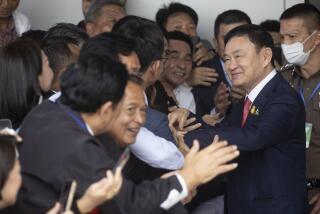Cambodian Leader Drops Role for Rebels : Asia: Sihanouk calls election turnout a repudiation of Khmer Rouge. He says it won’t be included in government.
- Share via
PHNOM PENH, Cambodia — Prince Norodom Sihanouk, Cambodia’s nominal head of state, said Wednesday that he is abandoning plans to include the Khmer Rouge guerrilla faction in a government of national unity.
Sihanouk’s statement reflected the sharply declining fortunes of the Maoist rebels after their failure to live up to reported threats to disrupt this week’s Cambodian national elections. The elections, six days of U.N.-supervised voting ending Friday, have not been marred by widespread violence, and Sihanouk told a group of French Parliament members that the huge voter turnout is a repudiation of Khmer Rouge tactics.
Sihanouk, head of state since he returned to his homeland in 1991 after a 13-year exile, also said he would agree to become an American-style president or a constitutional monarch after the current elections are over.
A U.N. spokesman said that voting on Wednesday, the first day mobile polling stations were used after three days at fixed sites, was fairly light. But an additional 120,000 voters cast ballots in the province of Kompong Cham, where polling had been curtailed because of security threats. Kompong Cham will choose 18 of the 120 seats in the new Constituent Assembly, the most of any province.
The spokesman predicted that about 4.2 million of the country’s 4.6 million registered voters would cast ballots by Wednesday night, and he said the turnout was more than 85% in 10 of the country’s 21 provinces. The new assembly is to draft a constitution and choose a government by late August.
Sihanouk earlier had raised the possibility of including the Khmer Rouge in a government of “national reconciliation” even though the guerrillas boycotted the elections and fielded no candidates.
But on Wednesday, Sihanouk issued a statement in which he renounced “definitively my proposal to form a quadripartite government of national reconciliation including the participation of the Party of Democratic Kampuchea (Khmer Rouge).”
The quadripartite government referred to the four main factions in Cambodia’s civil war, but there are now 20 parties participating in the election.
Sihanouk said it is up to the elected assembly to decide whether to include the Khmer Rouge in a future government.
The Khmer Rouge is widely hated in Cambodia for a brutal reign in the 1970s that left a million Cambodians dead.
Paradoxically, the Phnom Penh administration headed by Premier Hun Sen, which has been opposed to including the Khmer Rouge in a future government, appeared to soften its position Tuesday.
The government is opposed only to the “historic leaders” of the Khmer Rouge and not to the rank and file of the party, spokesman Khieu Kanarith said.
Sihanouk’s son, Prince Norodom Ranariddh, whose FUNCINPEC (a French acronym for National United Front for an Independent, Neutral, Peaceful and Cooperative Cambodia) is believed to have mounted the largest challenge to the Phnom Penh government in the elections, also said he does not want Khmer Rouge participation in the government because its members will not be elected.
The guerrilla faction said in radio broadcasts last week that it wants to participate in a four-party government of national reconciliation under Sihanouk’s direction. It is widely believed that the group refrained from attacking during the election in hopes of smoothing the way for Sihanouk.
Sihanouk technically will hold no post in the next government, but it seems certain that the country will have presidential elections before the summer is out and that Sihanouk will be unopposed.
More to Read
Sign up for Essential California
The most important California stories and recommendations in your inbox every morning.
You may occasionally receive promotional content from the Los Angeles Times.













